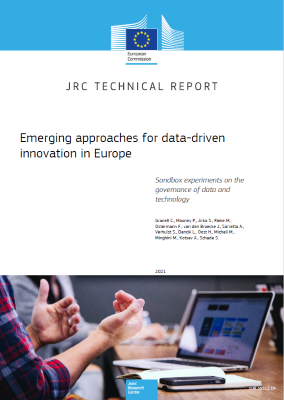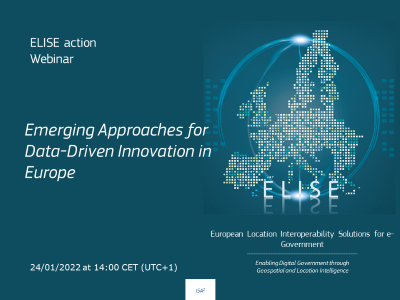
How novel approaches can facilitate and catalyse the exchange of data in line with European values, infrastructures and legal frameworks?

Acknowledging the key role that emerging technologies and innovative approaches for data sharing and use can play to make European data spaces a reality, the webinar will present the results of a set of experiments and research conducted by a selected pool of experts which are presented in the upcoming JRC report “Emerging Approaches for Data-Driven Innovation in Europe”. The research and experiments collected in the report investigated emerging technologies and innovative approaches for data sharing and use, and the socio-technical factors and forces that occur in data-driven innovation. The results shed some light in terms of lessons learned and provide practical recommendations towards the establishment of European data spaces.
In this webinar, Alexander Kotsev, Marco Minghini, Marina Micheli and Sven Schade, from the Digital Economy Unit of the European Commission’s Joint Research Centre together with Carlos Granell from the Universitat Jaume I de Castellón will introduce the report and set the scene from the scientific and policy perspective.
The three subsequent sessions will address the following topics:
- Innovative approaches to data sharing through sandboxing, with Alessandro Sarretta from National Research Council, Italy, Peter Mooney from Maynooth University, Ireland and Just van den Broecke from OSGeo.nl, The Netherlands.
- IoT and decentralised architectures, with Frank Ostermann from University of Twente, The Netherlands, and Simon Jirka and Matthes Rieke from 52°North Spatial Information Research GmbH
- The social and organisational dimensions of data-driven innovation at the local level, with Stefaan Verhulst from The GovLab, New York University, US, Lina Dencik from Cardiff University and Hillen Oost from Association of Dutch Municipalities / Futura Nova.eu, The Netherlands will present Each session will have a discussant from the EU Commission and a Q&A in which participants will have the chance to interact and share their experiences.
From this webinar, different stakeholder groups may benefit:
- Digital public service providers interested to understand how to best leverage on location information and solutions to optimise their services
- IT practitioners interested in learning from sandbox experiments on data management and processing
- Policy makers willing to understand misalignment between EU data policy iniatives and current local pratices for setting up local data ecosystems, and how to address them
- Academics curious to learn emerging key issues on data-driven innovation from technological and organizational perspectives

The webinar will take place on 24/01/2022 at 14h00 CET (UTC+1).
If you are interested in this webinar, do not hesitate to register by clicking on the following button. You will receive a confirmation email with the instructions on how to join this webinar.

If you cannot join, register anyway, we will send you both the slides and the recording of the session.
After the webinar, you will be able to find here both the recording and the supporting slides of this webinar.
If you are interested in knowing more about ELISE Webinars you can find further information here.
References
Details
| Presentation of the report and scene setting from a scientific and policy perspective Alexander Kotsev, Marco Minghini, Marina Micheli & Sven Schade, European Commission, JRC Carlos Granell, Universitat Jaume I de Castellón, Spain |
14:00 – 14:15 |
Session 1. Innovative approaches to data sharing
|
14:15 – 14:50 |
Session 2. IoT and decentralised architectures
|
14:50 – 15:15 |
Session 3. The social and organisational dimensions of data-driven innovation
|
15:15 – 15:50 |
| Wrap-up and next steps | 15:50 – 16:00 |

